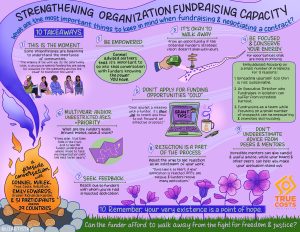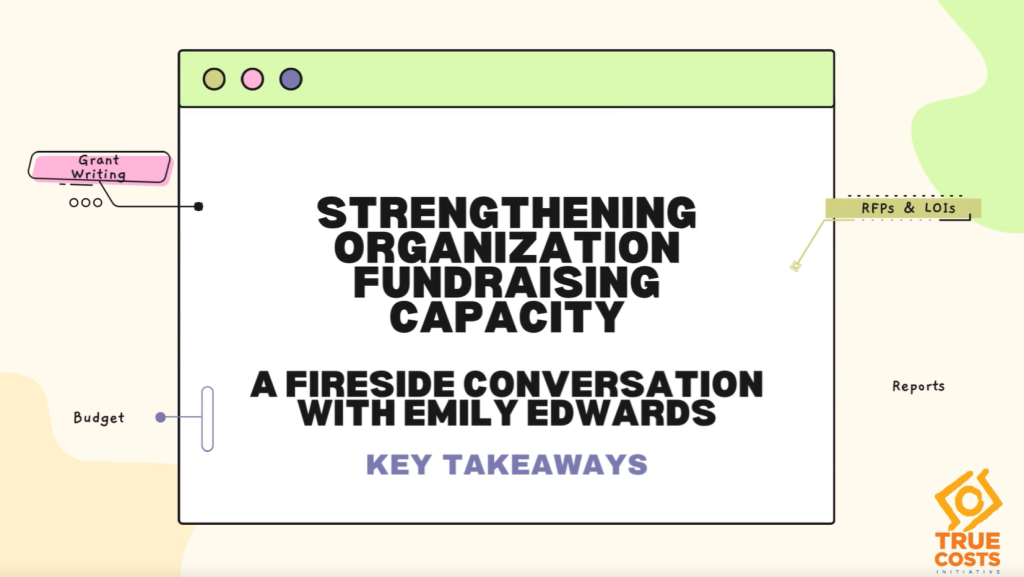On January 18, 2023, True Costs Initiative (TCI) and Draper Richards Kaplan (DRK) Foundation joined forces to host Strengthening Organization Fundraising Capacity: A Fireside Conversation with Emily Edwards. The sense of camaraderie was palpable as Conniel Malek, TCI’s Executive Director, and Emily Edwards, DRK’s Senior Director of Portfolio Fundraising Strategies, exchanged ideas, experience, and advice about navigating the challenges that come along with seeking funding. 51 participants from 29 countries tuned in to have access to valuable knowledge and resources, all with the common goal of sourcing funding to continue their invaluable work supporting communities that live with the impact of climate change and extractivist activities.
The participants represented TCI grantee partners and identified as People of the Global Majority (PGM) and/or Black, Indigenous, or People of Color (BIPOC). It is unfortunately well-documented that PGM and BIPOC-led organizations have difficulty acquiring funding. During the Conversation, Conniel and Emily emphasized the importance of recognizing that the participants’ time and energy are valuable, and that they too can choose which potential funders to engage with and when to disengage. They also encouraged the participants to not be deterred by rejection and to feel empowered to ask funders for feedback even after rejection.
From the feedback we have received, it is clear that many participants walked away from this event with useful tips and practical tools that they can apply when looking for the funding they deserve. What we did not anticipate was how much of a learning experience it would be for us as former fundraisers now working for a funding organization. We have had the chance to reflect on what we wish we knew when fundraising and how to be better philanthropists, and we are humbled by the opportunity to share our learnings.

Learnings from Peggy:
I used to work closely with a nonprofit’s fundraising team to help secure funds and write reports for funders. To my knowledge, we had never walked away from funding. To hear Emily say, “It’s ok to walk away if the potential funder’s strategic vision doesn’t align with yours,” was shocking. How can anyone say no to funding that will potentially allow you to do more and serve more people?
Emily’s statement reminded me of all the times that funding was too prescriptive, required too many program shifts, or simply did not align with our values. For instance, one grant used a “pay-for-performance” model. The dollars we received year to year depended on whether we were able to meet metrics for that year. This encouraged us to provide services that focused on more surface-level, measurable goals rather than long-term sustainable impact. It also put undue burden on program staff who were not only responsible for direct services but also responsible for answering to the funder. Another grant required our programming to shift such that we needed staff members with different skill sets, yet did not allow the budget for professional development for current staff to receive training for new certifications. We asked, they said no, and we wound up spending more to hire externally when there were staff members who were more than happy to learn and grow within the organization. And as a final example that might be relatable for many nonprofits, multiple grants required lengthy, complex reports but did not provide funding for data analytics and visualization tools, or salaries for data collection and analysis.
Emily was not saying to run away from funding whenever there are challenges. Rather, she was giving us permission to shift our approach. Instead of trying to adjust and shapeshift into what we believe will make us more competitive for a grant and future funding, we could have sought grants that aligned more with our values, culture, and capacity from the beginning. And for the ones that don’t align strategically—“It’s ok to walk away.”
Learnings from Loretta:
I’m appreciative of being on this side of fundraising—providing funding as opposed to seeking it. It’s a lot easier. In my former role, I worked diligently to find and submit Request for Proposals ( RFPs), Letter of Intents (LOIs), and other variations of grant applications for a non-profit. I was a newbie, thrown into this world with no prior experience. And it was hard. I didn’t know where to look or who to turn to for guidance and resources. As Fundraising Assistant, and later Fundraising Coordinator, I heard one “yes.”
I felt dejected. I was being paid to get the organization money and I was failing miserably. Not only that, but I also had a really bad case of impostor syndrome. Why was I chosen for this role? I clearly am not the right person. I lack experience and I don’t belong here.
It wasn’t until we facilitated this conversation between Emily and Conniel that I was able to let go of the negative talk that I had internalized about my abilities. Unfortunately, rejection is a “normal” part of fundraising. There are so many other organizations out there dedicated to their missions and deserving of funding that it’s impossible to always get an affirmative answer to a RFP. I learned to not take the “no”s personally and realize that it is not a reflection of my work ethic, skills, or the deservedness of my previous employer. It is much more a reflection of how philanthropy needs to adapt and become more holistic. I’m honored to be part of an organization that’s working to do better.
Learnings from Nittaya:
I used to be extremely excited when sharing about our work and the incredible communities I and my team worked with as a way to advocate for the funding and resources that they truly deserve—be it when a funder visited our site or when writing a narrative report. However, trying to formalize our fundraising strategy while putting so much energy and hope into the application process was overwhelming. I wish someone had walked me through what it means to preserve energy when seeking funding the way Emily practically did. “Only pursue a small number of funders that are promising at a time,” Emily advised. Five at a time specifically. Then keep assessing how promising each of these five are and prioritize who to continue engaging, which relationship to let go, and who else to include in the pool to replace those being let go. When not sure who to continue engaging and who to let go, Emily wisely said, “Engagement that doesn’t exhaust your energy and resources is good to keep the door open.”
And now that I’ve been on the other side of the fundraising process, I continue to see myself as an advocate for the communities in need, and specifically as our partners’ “advocate.” Yet, it’s not until Emily said, “It’s their job [program officer, board member, or whoever representing the respective potential funder] to teach you how to put forward an effective proposal,” that I gained a new kind of confidence and clarity about my role. Hearing Emily, I feel as if someone just reaffirmed to me, “You have always been doing the right thing,” and that’s empowering.
*****
We cannot help but wonder how empowered we would have been in fundraising had we been exposed to the same resources that Emily now provided. How much resources would we have brought in to do some incredible and impactful work? We will never know.
We are not perfect as a funder. We have our own limitations, as we are operating in such a flawed international development aid system. But these learnings help remind us of some of the ways we can do our job better. TCI wants to continue to remind our partners that their very existence is a point of hope, so they should not have to jump through a number of hoops for minimal funding. They should not be afraid to walk away from an opportunity that does not serve them or is not worth their time and energy. We hope that our personal learnings also serve as a call to action for the field of philanthropy to do things differently. Trust organizations to best know how to use funds, and be open to organizations that reach out to you wanting insights into how to put forth an effective proposal. They deserve our support.
